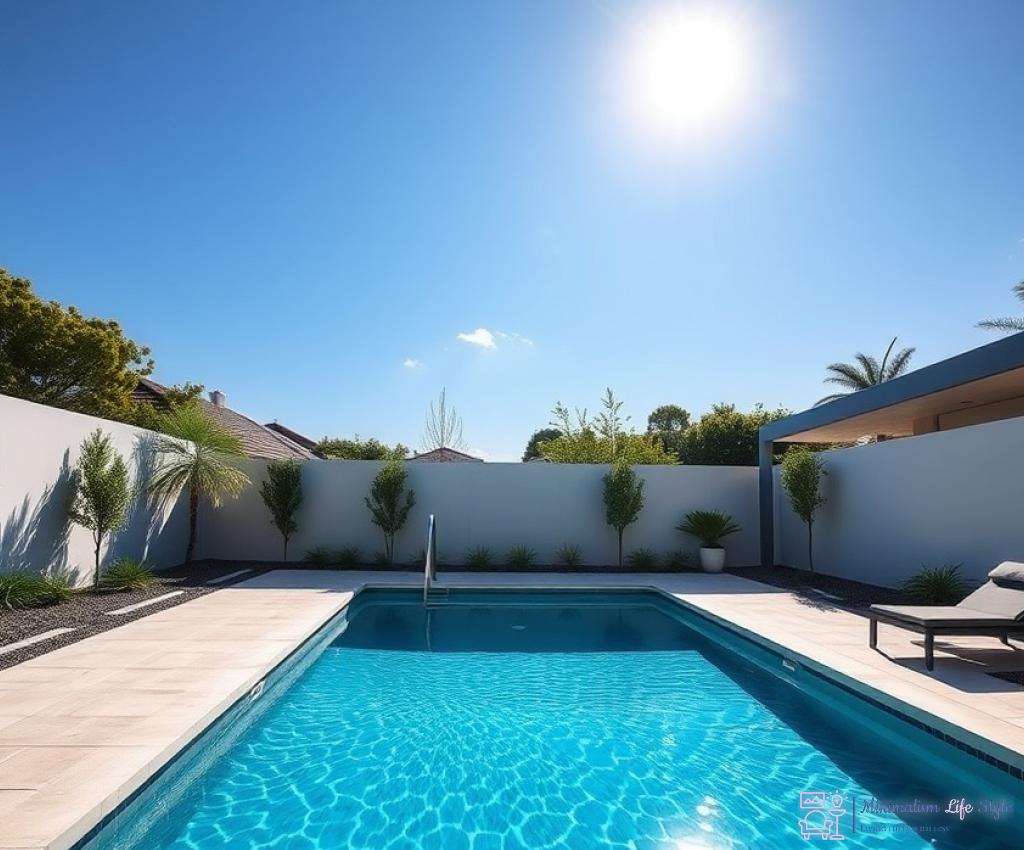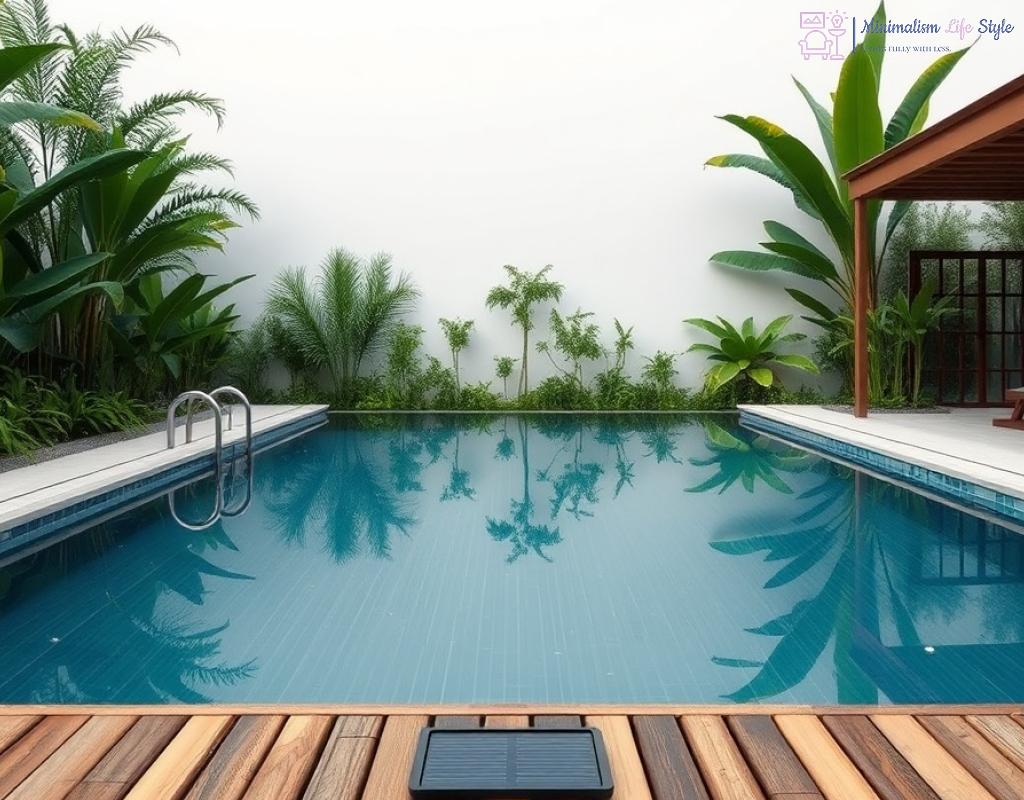Choosing Eco-Friendly Pool Materials

Making a Splash with Sustainable Choices
When it comes to building or renovating your swimming pool, the materials you choose can make a significant impact on the environment. Opting for eco-friendly pool materials not only enhances the aesthetic appeal of your backyard oasis but also reduces your ecological footprint. Let’s dive into the options that can transform your pool into a sustainable haven.
Natural Stone vs. Traditional Concrete
The debate between natural stone and traditional concrete is an important one. While concrete pools have long been the standard, they can be less sustainable due to the high energy costs associated with their production. Natural stone, on the other hand, offers a beautiful, earthy alternative that is often sourced locally. This not only minimizes transportation emissions but also integrates your pool seamlessly with the surrounding landscape.
| Material | Environmental Impact | Durability | Cost |
|---|---|---|---|
| Natural Stone | Low (locally sourced) | High | Variable |
| Traditional Concrete | High (energy-intensive) | High | Moderate |
Recycled Materials: A Smart Choice
In the quest for eco-friendly pool materials, recycled options are gaining popularity. From recycled glass tiles to repurposed plastics for pool decking, these materials not only divert waste from landfills but also offer unique aesthetics and durability. Utilizing recycled materials can significantly lower the carbon footprint of your pool, making it a standout feature that tells a story of sustainability.
Here’s a list of some innovative eco-friendly materials that can elevate your pool’s design while being kind to the planet:
- Recycled Glass Tiles: Stunning and unique, perfect for pool interiors.
- Bamboo Decking: Fast-growing and renewable, ideal for outdoor spaces.
- Solar Pool Covers: Reduces heat loss, made from recycled materials.
Harnessing Solar Power for Pool Heating

As we delve deeper into the realm of sustainable swimming pools, one of the most effective methods to maintain a comfortable swimming temperature while being kind to the environment is by harnessing solar power for pool heating. This innovative approach not only utilizes a renewable energy source but also significantly reduces energy costs, allowing pool owners to enjoy their aquatic sanctuary guilt-free. By embracing solar technology, you can transform your pool into an eco-friendly retreat that shines brightly under the sun.
The process of using solar energy for pool heating is surprisingly straightforward. It typically involves installing solar panels on your roof or in your yard, which capture sunlight and convert it into heat. This heat is then transferred to your pool water, ensuring that your swimming experience is always inviting. As you consider the environmental benefits, it’s important to recognize that solar heating systems often have a minimal carbon footprint and require little maintenance once installed.
When evaluating the efficiency of solar pool heating systems, various factors come into play. The orientation and angle of the solar panels, the size of your pool, and the local climate all influence the effectiveness of the system. In sunny regions, these systems can provide a substantial percentage of the heat needed, while in areas with less sunlight, they can still significantly reduce the reliance on conventional heating methods. A well-placed solar pool heater can extend your swimming season and ensure that you maximize the use of your pool throughout the year.
To further enhance the efficiency of your solar heating system, consider combining it with a solar cover. This simple addition can trap heat overnight and minimize evaporation, making the most of the energy collected during the day. Together, solar panels and covers create a powerful duo in the pursuit of eco-friendly pool maintenance. As you embark on your journey to a sustainable swimming pool, investing in solar power not only aligns with your environmental goals but also fosters a deeper appreciation for the natural resources at your disposal.
Natural Filtration Systems: A Greener Alternative
In the pursuit of a sustainable swimming pool, natural filtration systems emerge as an innovative and eco-conscious choice. These systems not only ensure crystal-clear water but also minimize chemical usage, creating a healthier swimming environment for both users and the ecosystem. With the growing concern over chemical pollutants and their effects on health and nature, many pool owners are seeking alternatives that harmonize with nature. Let’s explore how natural filtration systems can transform your pool maintenance into a greener, more sustainable practice.
The Essence of Natural Filtration
Natural filtration systems utilize the power of biological processes to maintain water clarity and quality. Unlike traditional filtration methods that rely heavily on chemicals and energy-intensive machinery, these systems harness the natural cleansing abilities of plants and microorganisms. By integrating elements such as gravel beds, aquatic plants, and beneficial bacteria, natural filtration creates a balanced ecosystem that effectively purifies water.
An intriguing aspect of these systems is their ability to foster biodiversity. By introducing aquatic plants, you not only enhance the aesthetic appeal of your pool area but also create habitats for local wildlife, supporting the broader ecosystem. This symbiotic relationship between your pool and nature is a key factor in the sustainable approach to pool ownership.
Comparing Traditional and Natural Filtration
When weighing the benefits of natural filtration against traditional systems, it’s crucial to consider factors such as cost, maintenance, and environmental impact. While initial installation costs for natural filtration may be higher, the long-term savings on chemicals and energy can make it a more economical choice. Moreover, natural systems typically require less maintenance over time, as they work in harmony with nature rather than against it.
| Criteria | Traditional Filtration | Natural Filtration |
|---|---|---|
| Initial Cost | Moderate to High | High |
| Ongoing Costs | High (Chemicals & Energy) | Low (Minimal Chemicals) |
| Maintenance | Regular Chemical Balancing | Minimal, Ecosystem-Based |
| Environmental Impact | High (Chemical Runoff) | Low (Eco-Friendly) |
Ultimately, the choice between traditional and natural filtration systems depends on individual preferences and priorities. However, with the push towards eco-friendly practices, natural filtration stands out as a compelling option for those looking to reduce their ecological footprint while enjoying a beautiful and functional swimming space.
As we continue to navigate the complexities of pool maintenance, embracing natural filtration systems represents a significant step towards sustainability. By choosing this greener alternative, pool owners not only enhance their outdoor oasis but also contribute positively to the environment, making a splash in the world of eco-conscious living.
Water Conservation Techniques for Pools
In the quest for sustainability, water conservation has emerged as a critical focal point for pool owners. With the rising challenges of climate change and water scarcity, implementing effective water-saving techniques can significantly enhance the environmental profile of your swimming pool. By making informed choices, you can enjoy your aquatic retreat while minimizing waste and promoting responsible water usage. Let’s explore some innovative strategies that can help you maintain a beautiful pool without compromising on water conservation.
Smart Pool Cover Practices
One of the most impactful methods for conserving water in your swimming pool is the use of a high-quality pool cover. These covers not only help to keep your pool clean by preventing debris from entering but also drastically reduce evaporation rates. By covering your pool when it’s not in use, you can save a considerable amount of water over time. This simple yet effective practice ensures that your pool remains filled and ready for enjoyment while minimizing the need for refills. Investing in a solar cover can further enhance this benefit, as it not only conserves water but also helps to maintain warmth, reducing energy costs.
Efficient Water Management Systems
Another vital component of eco-friendly pool maintenance is the incorporation of efficient water management systems. Utilizing advanced technology such as automated water level controls can help to monitor and maintain optimal water levels in your pool. These systems work by automatically adding water when evaporation occurs, ensuring that you are not overfilling your pool unnecessarily. Furthermore, integrating a rainwater harvesting system can provide an alternative source for filling your pool. By collecting and utilizing rainwater, you can significantly reduce reliance on municipal water supplies and promote a more sustainable approach to pool ownership.
Regular Maintenance and Leak Detection
Maintaining your pool in optimal condition is essential not only for hygiene but also for water conservation. Regular checks for leaks and prompt repairs can prevent significant water loss. Even small leaks can lead to substantial wastage over time, so being proactive in maintenance is key. Additionally, routine cleaning and upkeep of the pool’s filtration system ensure that it operates efficiently, further conserving water in the long run. By embracing these practices, you contribute to a healthier ecosystem while enjoying a pristine swimming experience.
Eco-Friendly Pool Cleaning Solutions
As we strive for sustainability in every aspect of our lives, the way we maintain our swimming pools should also reflect eco-conscious choices. Traditional pool cleaning methods often rely on harsh chemicals that can harm the environment and pose health risks. Fortunately, there are innovative, eco-friendly cleaning solutions that not only keep your pool sparkling clean but also prioritize the planet. Let’s explore how you can achieve a pristine pool without compromising your commitment to sustainability.
Natural Cleaning Agents: Harnessing the Power of Nature
One of the simplest ways to maintain a clean pool is by utilizing natural cleaning agents. Many common household items can replace chemical-laden products, providing effective cleaning while being gentle on the environment. For instance, baking soda is a fantastic multi-purpose cleaner that can be used to scrub pool surfaces and balance pH levels. Similarly, vinegar can serve as a powerful disinfectant and deodorizer. These natural alternatives not only reduce harmful chemical exposure but also contribute to a healthier pool ecosystem.
Innovative Tools for Eco-Friendly Cleaning
In addition to using natural cleaning agents, incorporating innovative tools can revolutionize your pool maintenance routine. Consider investing in a robotic pool cleaner that uses minimal energy and operates efficiently, reducing both water and electricity consumption. These devices are designed to navigate your pool autonomously, removing debris without the need for excessive water usage from traditional vacuuming systems. By choosing energy-efficient tools, you can enjoy a clean pool while minimizing your ecological footprint.
The Benefits of Regular Natural Maintenance
Maintaining a sustainable swimming pool also involves adopting a routine that emphasizes natural maintenance practices. By scheduling regular cleanings using eco-friendly methods, you can prevent the buildup of algae and debris, which often require harsher treatments to eliminate. Additionally, regular maintenance allows you to monitor water quality and reduce chemical use, creating a more balanced aquatic environment. Here’s a list of key practices to consider for eco-friendly pool maintenance:
- Utilize natural cleaning agents like baking soda and vinegar.
- Incorporate robotic cleaners to minimize water and energy usage.
- Establish a routine for regular cleanings to prevent chemical reliance.
- Monitor and adjust water quality naturally to reduce the need for harsh treatments.
By embracing these eco-friendly cleaning solutions, pool owners can ensure their swimming spaces remain inviting and healthy while making a positive impact on the environment. Each small change contributes to a larger movement towards sustainable living, allowing you to enjoy your pool with peace of mind.




